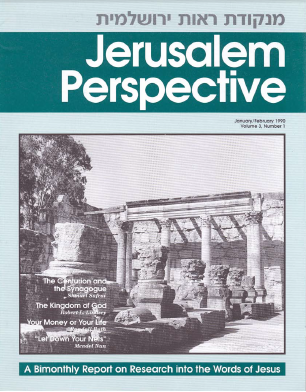מְתֻרְגְּמָן (me⋅tur⋅ge⋅MĀN) is Hebrew for “translator.” The articles in this series illustrate how a knowledge of the Gospels’ Semitic background can provide a deeper understanding of Jesus’ words and influence the translation process. For more articles in this series, click here.
Revised: 24-Oct-2013Sometimes a translation can be dramatically changed when the translator learns more about the culture in which the original events took place. Luke 20:25 is one such instance.
During the final week of Jesus’ ministry, a crisis developed with the religious authorities. First, Jesus tried to stop the money lenders and the merchants from operating in the Temple. The religious authorities demanded an explanation of his actions, and he responded with a parable about wicked tenants who beat and killed their landlord’s son. The authorities knew the parable was spoken against them, and they sent agents to try to catch Jesus in a word against the Roman government so that they could have him arrested and condemned.
Loaded Question
![Gold denarius bearing the portrait of Tiberius, who was Roman emperor when Jesus said, "Give to Caesar what is Caesar's and to God what is God's." The Latin inscription reads: "TI CAESAR DIVI AVG[usti] F[ilius] AVGVSTVS" (Tiberius Caesar, son of the deified Augustus, Augustus). (Courtesy of the Israel Museum, Jerusalem)](https://www.jerusalemperspective.com/wp-content/uploads/1990/01/Denarius-Tiberius-295x300.jpg)
(Courtesy of the Israel Museum, Jerusalem)
“Should we pay taxes to Caesar or not?” The question was loaded. The pious people saw the Roman government and army as a denial of God’s promises to Israel, pagans who defiled the country by their presence. Many longed for the freedom they enjoyed in the days of the Maccabees, and the faithful believers expected God to send his Messiah to liberate them. No self-respecting prophet would tell the pious people that God was happy with Roman rule and that they should be content with the taxes and idolatrous practices of the Roman officials. But if Jesus said anything about a coming day when they would not pay taxes to Rome, the agents of the religious authorities would be able to testify that Jesus advocated the overthrow of Roman rule.
Jesus’ answer is famous, though its impact on the immediate audience often is underestimated or misunderstood. “Give me a denarius. Whose image and inscription are on it?” “Caesar’s.” “Then give to Caesar what is Caesar’s and to God what is God’s.”
Paid Content
Premium Members and Friends of JP must be logged in to access this content: Login
If you do not have a paid subscription, please consider registering as a Premium Member starting at $10/month (paid monthly) or only $5/month (paid annually): Register
One Time Purchase Rather Than Membership
Rather than purchasing a membership subscription, you may purchase access to this single page for $1.99 USD. To purchase access we strongly encourage users to first register for a free account with JP (Register), which will make the process of accessing your purchase much simpler. Once you have registered you may login and purchase access to this page at this link:


































































































